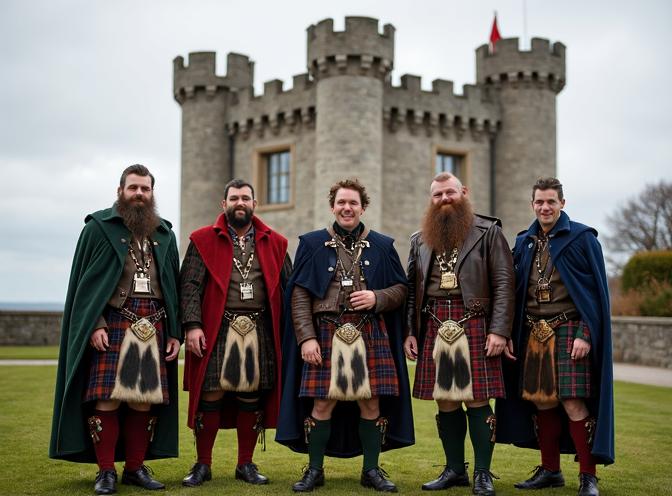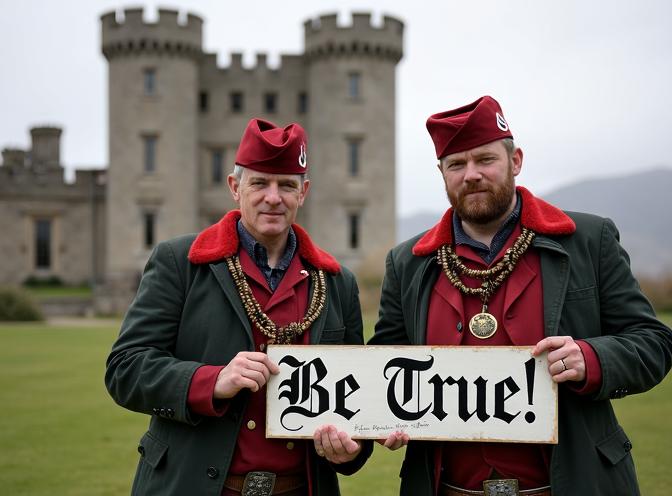No True Scotsman - Definition and Examples
Contents
The “No True Scotsman” fallacy, is a form of informal logical fallacy that arises when one tries to defend a generalization by excluding counterexamples. This defense mechanism is enacted by redefining terms in order to make an argument valid, thus protecting sweeping generalizations from being proven false
The No True Scotsman logical fallacy, also known as the appeal to purity, is a form of informal fallacy that arises when someone tries to defend a universal claim by excluding counterexamples as not being “true” or “pure” enough. This defense mechanism is enacted by redefining terms in order to make an argument valid, rather than acknowledging and addressing the evidence that contradicts the generalization, thus protecting sweeping generalizations from being proven false.
Definition
The “No True Scotsman” logical fallacy is a common rhetorical tactic used to defend a generalization by arbitrarily excluding counterexamples. The fallacy occurs when someone makes a universal claim about a group, and upon encountering evidence that contradicts this claim, they redefine the group in a way that excludes the counterexample. This allows them to maintain their original statement without acknowledging the contradictory evidence.

The “No True Scotsman” fallacy involves the following structure:
- Initial Claim: A generalization is made about a group (e.g., “All Scotsmen put milk in their porridge.”).
- Counterexample: Someone presents a specific instance that contradicts this claim (e.g., “But my uncle is Scottish and he doesn’t put milk in his porridge.”).
- Redefinition: The person who made the initial claim redefines the group to exclude the counterexample (e.g., “Well, no true Scotsman puts milk in their porridge.”).
Origin
The phrase “No true Scotsman” originates from a hypothetical anecdote first reported in the magazine Facts in 1976. The story goes that a philosopher overheard someone claim,
- “No Scotsman puts sugar on his porridge,” only to have a Scotsman at the next table order sugar with his porridge.
- When the philosopher pointed this out,
- the initial speaker retorted, “Well, no true Scotsman puts sugar on his porridge”
This example highlights the fallacious nature of redefining a group to maintain a generalization. The fallacy was first described in this form by British philosopher Antony Flew.
No True Scotsman logical fallacy has been used in various contexts since then.
Historical Examples
Fashion
- In 19th-century Scotland, there was a debate about whether Highlanders were “true” Scotsmen if they wore tartan trousers instead of the traditional kilt. Those who opposed wearing tartan trousers argued that no true Scotsman would wear such attire.
Politics
- Religion: “All Christians are kind and loving.” When presented with historical examples of Christian violence, some might respond: “Well, no true Christian would behave that way.”
- During World War II, some Americans claimed that no true American would support isolationism or neutrality in the face of Nazi aggression. When presented with evidence of isolationist and neutralist views held by prominent Americans, they redefined what it meant to be a “true” American.
- During the height of the Civil Rights Movement in the United States, in 1964, a white supremacist leader named J.B. Stoner claimed that “no genuine American would support racial integration.” When confronted with evidence of Americans who did support integration, he redefined what it meant to be a “genuine” American.
- In 1970s South Africa, during the apartheid era, white nationalists argued that “no true Afrikaner would support racial equality.” When presented with counterexamples of Afrikaners who did support equality, they redefined what it meant to be a “true” Afrikaner.
- Political Ideology: “No real conservative supports universal healthcare.” Upon learning about conservatives who advocate for universal healthcare, the response might be: “Well, no true conservative opposes free markets.”
Media
- Journalism: A journalist might claim, “All reputable news sources check their facts.” When presented with a well-known outlet that made a factual error, they could say: “Well, no true reputable news source would make such an error.”
Modern Examples
Politics
- Patriotism: “Any real American loves their country unconditionally.” Someone might point to Americans who critique the government or policies. The response could be: “Well, no true American would criticize their country.”
- In a 2019 family discussion, someone argued that no true patriot would question the government’s policies. When presented with evidence of individuals who questioned these policies, they redefined what it meant to be a “true” patriot.
- Cultural Identity: “All Muslims are peaceful.” When presented with examples of violent extremists who identify as Muslim, some might say: “Well, no true Muslim engages in violence.”
- In 2020, during the US presidential election, some supporters of Donald Trump argued that no true conservative would vote for Joe Biden. When presented with evidence of conservatives who did vote for Biden, they claimed that those individuals were not “true” conservatives.
- Brexit: Some Brexiteers have been accused of using the No True Scotsman fallacy when they dismiss Remainers as not being ’true’ Britons or not understanding British values.
Media
- Online debates often see this fallacy in action. For example, if a commentator claims that all fans of a particular genre (e.g., science fiction) enjoy a specific show, and someone who identifies as a fan disagrees, the initial claimant might argue that the dissenter is not a “true” fan
- Social Media: “Any real journalist fact-checks their sources.” If a well-known figure makes an error, the response could be: “Well, no true journalist would make such a mistake.”
- In 2020, an article in The New York Times discussed the No True Scotsman fallacy in relation to the concept of “real” Americans. The article argued that some individuals use this fallacy to exclude certain groups from being considered “true” Americans.
- In 2019, a column in The Guardian criticized the use of the No True Scotsman fallacy by some Brexit supporters who claimed that no true democrat would support remaining in the EU.
Schools
- Within educational settings, this fallacy can arise when students or teachers are stereotyped as behaving uniformly in certain ways. If an exception is found, such as a student who does not fit the stereotype, one might redefine what it means to be part of that group to exclude them.
- If a teacher claims that all students who study hard will succeed, and a student provides an example where this is not true, the teacher might argue that the student in question did not study “truly” hard enough
- Cademic Integrity: “All students at this school are honest.” When a case of cheating is discovered, someone might say: “Well, no true student from our school would cheat.”
- A 2020 article in Education Week discussed how teachers can help students recognize and avoid the No True Scotsman fallacy in their arguments.
- In a 2019 lesson plan on logical fallacies, a teacher used the example of someone arguing that no true athlete would ever use performance-enhancing drugs. When presented with evidence of athletes who have used such substances, the student was asked to recognize and address the No True Scotsman fallacy.
Domestic Environments
- Family Values: “In our family, we always support each other.” If a family member behaves selfishly, the response could be: “Well, no true member of this family would act that way.”
- If a parent argues that all responsible children should do their chores without being asked, and a child points out instances where they did not comply, the parent might argue that these instances are not examples of the child being truly responsible
- In family dynamics, parents might assert that all children from good homes behave in a specific manner. When presented with evidence of a child acting contrary to this claim, they may redefine “good home” criteria to exclude the child’s upbringing as an example.
- Family Dynamics: Family members may use this fallacy in arguments, for example, claiming that no true member of their family would behave in a certain way, only to dismiss evidence to the contrary.
- In a 2020 Facebook post, someone argued that no true Christian would support same-sex marriage. When presented with evidence of Christians who support same-sex marriage, they claimed that those individuals were not “true” Christians.
- Friendship Groups: Friends might use it when discussing group norms or shared interests. For instance, one friend might claim that no true fan of a particular band would like another band, only to have another friend reveal they enjoy both. The initial speaker could then argue that the second friend isn’t a ’true’ fan.
Takeouts and further thoughts
The “No True Scotsman” logical fallacy is pervasive across various contexts and cultures. It allows individuals to dismiss inconvenient facts by redefining terms or groups in a way that excludes counterexamples, thereby maintaining their original generalization without genuine consideration of the evidence presented. The examples illustrate how the No True Scotsman fallacy is used in various contexts to defend universal claims and exclude counterexamples. Recognizing this fallacy can help improve critical thinking skills and foster more nuanced and intellectually honest discussions.

In conclusion, the no true Scotsman fallacy is a type of ad hominem argument that attempts to shut down debate by changing definitions in an ad hoc manner. It is a fallacy because it relies on the assumption that there is one true definition for any concept
FAQ
Q: What is the “No True Scotsman” fallacy?
- A: The “No True Scotsman” fallacy is a logical fallacy that occurs when someone attempts to protect a universal generalization from counterexamples by redefining the term in question to exclude the counterexample. It involves shifting the goalposts or changing the definition of a term mid-argument to dismiss evidence that might refute one’s position.
Q: What is the meaning of the “No True Scotsman” fallacy?
- A: The “No True Scotsman” fallacy means that instead of acknowledging valid counterexamples, an arguer modifies their definition in a way that makes their original claim seem true but increasingly vacuous or uninformative. This is often done to maintain the appearance of consistency in one’s argument while ignoring evidence to the contrary.
Q: Can you provide an example of the “No True Scotsman” fallacy?
- A: An example would be if someone claims, “All birds can fly,” and then is presented with the counterexample of penguins, which cannot fly. The person responds by saying, “Well, no true bird cannot fly.” This illustrates how the definition of a term (“bird”) is changed to exclude valid counterexamples.
Q: How can I recognize if someone is using this fallacy?
- A: You can recognize this fallacy when someone makes a sweeping claim about a group and then, upon encountering a counterexample, modifies the definition of the group to exclude that individual. This usually involves dismissing valid evidence by arbitrarily redefining terms in an ad hoc manner.
Q: How can I respond to this fallacy?
- A: To respond to this fallacy, challenge the person to maintain the original definition and insist on discussing the actual issue. Encourage them to engage with counterexamples constructively rather than dismissing them through arbitrary redefinitions.